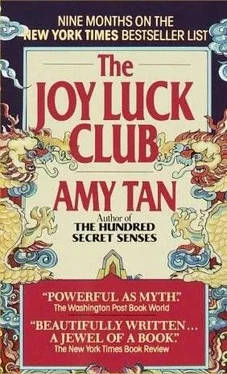He begins to talk, still standing at the window, looking into the night.
After fleeing Kweilin, your mother walked for several days trying to find a main road. Her thought was to catch a ride on a truck or wagon, to catch enough rides until she reached Chungking, where her husband was stationed.
She had sewn money and jewelry into the lining of her dress, enough, she thought, to barter rides all the way. If I am lucky, she thought, I will not have to trade the heavy gold bracelet and jade ring. These were things from her mother, your grandmother.
By the third day, she had traded nothing. The roads were filled with people, everybody running and begging for rides from passing trucks. The trucks rushed by, afraid to stop. So your mother found no rides, only the start of dysentery pains in her stomach.
Her shoulders ached from the two babies swinging from scarf slings. Blisters grew on her palms from holding two leather suitcases. And then the blisters burst and began to bleed. After a while, she left the suitcases behind, keeping only the food and a few clothes. And later she also dropped the bags of wheat flour and rice and kept walking like this for many miles, singing songs to her little girls, until she was delirious with pain and fever.
Finally, there was not one more step left in her body. She didn't have the strength to carry those babies any farther. She slumped to the ground. She knew she would die of her sickness, or perhaps from thirst, from starvation, or from the Japanese, who she was sure were marching right behind her.
She took the babies out of the slings and sat them on the side of the road, then lay down next to them. You babies are so good, she said, so quiet. They smiled back, reaching their chubby hands for her, wanting to be picked up again. And then she knew she could not bear to watch her babies die with her.
She saw a family with three young children in a cart going by. "Take my babies, I beg you," she cried to them. But they stared back with empty eyes and never stopped.
She saw another person pass and called out again. This time a man turned around, and he had such a terrible expression-your mother said it looked like death itself-she shivered and looked away.
When the road grew quiet, she tore open the lining of her dress, and stuffed jewelry under the shirt of one baby and money under the other. She reached into her pocket and drew out the photos of her family, the picture of her father and mother, the picture of herself and her husband on their wedding day. And she wrote on the back of each the names of the babies and this same message: "Please care for these babies with the money and valuables provided. When it is safe to come, if you bring them to Shanghai, 9 Weichang Lu, the Li family will be glad to give you a generous reward. Li Suyuan and Wang Fuchi."
And then she touched each baby's cheek and told her not to cry. She would go down the road to find them some food and would be back. And without looking back, she walked down the road, stumbling and crying, thinking only of this one last hope, that her daughters would be found by a kindhearted person who would care for them. She would not allow herself to imagine anything else.
She did not remember how far she walked, which direction she went, when she fainted, or how she was found. When she awoke, she was in the back of a bouncing truck with several other sick people, all moaning. And she began to scream, thinking she was now on a journey to Buddhist hell. But the fact of an American missionary lady bent over her and smiled, talking to her in a soothing language she did not understand. And yet she could somehow understand. She had been saved for no good reason, and it was now too late to go back and save her babies.
When she arrived in Chungking, she learned her husband had died two weeks before. She told me later she laughed when the officers told her this news, she was so delirious with madness and disease. To come so far, to lose so much and to find nothing.
I met her in a hospital. She was lying on a cot, hardly able to move, her dysentery had drained her so thin. I had come in for my foot, my missing toe, which was cut off by a piece of falling rubble. She was talking to herself, mumbling.
"Look at these clothes," she said, and I saw she had on a rather unusual dress for wartime. It was silk satin, quite dirty, but there was no doubt it was a beautiful dress.
"Look at this face," she said, and I saw her dusty face and hollow cheeks, her eyes shining back. "Do you see my foolish hope?"
"I thought I had lost everything, except these two things," she murmured. "And I wondered which I would lose next. Clothes or hope? Hope or clothes?"
"But now, see here, look what is happening," she said, laughing, as if all her prayers had been answered. And she was pulling hair out of her head as easily as one lifts new wheat from wet soil.
It was an old peasant woman who found them. "How could I resist?" the peasant woman later told your sisters when they were older. They were still sitting obediently near where your mother had left them, looking like little fairy queens waiting for their sedan to arrive.
The woman, Mei Ching, and her husband, Mei Han, lived in a stone cave. There were thousands of hidden caves like that in and around Kweilin so secret that the people remained hidden even after the war ended. The Meis would come out of their cave every few days and forage for food supplies left on the road, and sometimes they would see something that they both agreed was a tragedy to leave behind. So one day they took back to their cave a delicately painted set of rice bowls, another day a little footstool with a velvet cushion and two new wedding blankets. And once, it was your sisters.
They were pious people, Muslims, who believed the twin babies were a sign of double luck, and they were sure of this when, later in the evening, they discovered how valuable the babies were. She and her husband had never seen rings and bracelets like those. And while they admired the pictures, knowing the babies came from a good family, neither of them could read or write. It was not until many months later that Mei Ching found someone who could read the writing on the back. By then, she loved these baby girls like her own.
In 1952 Mei Han, the husband, died. The twins were already eight years old, and Mei Ching now decided it was time to find your sisters' true family.
She showed the girls the picture of their mother and told them they had been born into a great family and she would take them back to see their true mother and grandparents. Mei Chang told them about the reward, but she swore she would refuse it. She loved these girls so much, she only wanted them to have what they were entitled to-a better life, a fine house, educated ways. Maybe the family would let her stay on as the girls' amah. Yes, she was certain they would insist.
Of course, when she found the place at 9 Weichang Lu, in the old French Concession, it was something completely different. It was the site of a factory building, recently constructed, and none of the workers knew what had become of the family whose house had burned down on that spot.
Mei Ching could not have known, of course, that your mother and I, her new husband, had already returned to that same place in 1945 in hopes of finding both her family and her daughters.
Your mother and I stayed in China until 1947. We went to many different cities-back to Kweilin, to Changsha, as far south as Kunming. She was always looking out of one corner of her eye for twin babies, then little girls. Later we went to Hong Kong, and when we finally left in 1949 for the United States, I think she was even looking for them on the boat. But when we arrived, she no longer talked about them. I thought, At last, they have died in her heart.
Читать дальше












